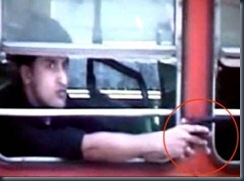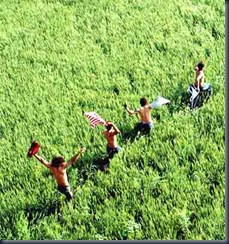Rahul Raj is dead, killed by the bullets fired by policemen for whose subsistence ,taxes have been paid by his parents. Psychiatrists will delve into his behaviour, as to why he got a gun, held the conductor and several passengers of the BEST bus captive, fired a few shots and why he wanted to talk to Raj Thackeray.
Was it a Rang De Basanti syndrome--in which a protest is launched against the misdoings of an omnipotent state by the youth of India? Was it an effort to have publicity, in which ,like in films, he would be on National TV , declaiming the wrongness of the actions of the MNS goons? Was it an attempt to give a voice and action to the thousands of Bihari youths, who migrate outside the state in an effort to get a sustainable livelihood--the opportunity for which is lacking in their home state? Or was it a protest at the looting by the rest of the country of Bihar's and Eastern India's immense natural resources for little compensation by the Central Government for quite a few decades? Or was it just the expression of foolishness by a boy of limited intelligence who did not know any better?
The fact remains however, that a gun toting youth, who had killed no one and who had no criminal records, was killed by a hundred policemen whose efforts at controlling real killers of the Underworld still leaves a lot to be desired, and whose efforts at controlling the MNS miscreants, is still questionable.
The fact remains that a young adult of India has been killed by a State which guarantees a fundamental right to work anywhere in this country--and possibly that was all this misguided Rahul was wanting.
True, enquiries will be launched, no police officer will be deemed guilty, a report by the CBI or a retired Supreme Court Judge or the concerned department will gather dust and the incident will worry us for a few days , before being forgotten under the pressure of work. Did the police have justification for their action? Yes, they will say. An unstable youth with a gun, who had allegedly injured a passenger, had taken a government employee hostage, and who refused to surrender--needed to be stopped. Of course, we tried to aim at the peripheral parts of the body, but we failed. There is a limit to police patience. We were apprehensive that he would cause further damage to personnel and property. And that of course will be accepted.
Years ago . when I was a registrar at a Government Medical College, Mamata Banerjee and her firebrand Trinamool Congress party launched a misguided agitation to march to the Mahakaran, the seat of the West Bengal Government. After they breached one of the barriers, the police opened fire. 21 persons died and hundreds were injured. I would never forget that evening.
The injured and dying were coming in streams. We were tackling the cases on the floor, on the beds, resuscitating them and sending them to the operating theatres. Most had bullet injuries, fractures, abrasions, cut injuries etc. As I prepared to leave for the Operating room, I noticed a young boy in one corner, lying on the makeshift bed.An IV drip was running, Oxygen was being supplied, and a harassed intern was pressing a sterile dressing to his chest wound to stem the bleeding. There was a feeble pulse and the boy was gasping. I bent down and he suddenly clasped my hand. His eyes opened for a few moments, as he glanced at me. I gripped his hand and started shouting for him to be taken to the cardio-thoracic Operation Theatre. As the trolleys started coming in, the boy gasped again, and there was no pressure on my hand. We started APR, but to no avail. That absence of pressure on my hand was the signal that life had flown out through the small wound in his chest, killed by a state which would not listen to him.
I have grasped since then, thousands of hands, but even now I can feel the pressure on my hand--and then the absence of it.
That is how easy it is to be killed. It is so much more difficult to live. That is why such deaths still pain me--and I wonder as to why we are slowly losing our patience and compassion--and why deaths like this are getting commoner by the day.






5 comments:
Sometimes generalizations can ruin an incident. As a concerned Indian citizen, I agree with your thoughts. But pressure situations do require immense thought before action and sometimes the margin between sanity and insanity fades.
I can safely say that in situations of doubt and pressure, take an action which you would not regret later. Lets have the power to be convinced to say 'yes' or 'no' and not run away from responsibility. As citizens let us not be in regret and say
"Had I said that, had I done this,
So might I have gained, so might I have missed"
These days, when I read the newspaper, it’s with a lot of apprehension.Not a day passes without the occurrence of some horrific incident which is etched in the minds of the victims forever. It has perhaps become the way of life. Blasts come into our lives just like brushing one's teeth every morning.
Compassion and empathy are essential human qualities that allow one to feel, understand, and respond to the suffering of others,
the victims relatives grieve for what has been taken from them, and we grieve with them for a few days.
The question that tortures me every now and then is who is to be blamed...
will u call it people loosing there compassion if they decide to move on with there lives after reading there morning newspaper or will u call them brave for excepting the truth and having the courage to go out and in a way show that they are not going to give up or
is it the governments fault who clear off there hands by giving monetary compensation to the victims and their families.
or is it the fault of people like us who sit here and do nothing about the state of affairs and play the blame game! even if one of us has the courage to stand up and say his views , hes silenced forever by the people who have the power!
Let there be a change in attitude. Let us always try to move out of crevices and ruts.Realisation leads to concern. Persistent concerns lead to motivation. Motivation leads to change in attitude. Collective attitudes lead to demands for change. When these demands become overwhelming--the powers that be(Media houses, politicians, governments, authorities) are forced to take note in a democratic system(no matter how diluted or corrupted it is).But through it all must run the essential thread of concern about fellow human beings. That is the Society we all crave for--responsive, active,vigilant and fair.
What I personally feel is that literacy is very low in India.Illiterate people are very superstitious and can be easily motivated for causes good or bad. Although we certainly do qualify for being one of the most religious people on planet E,we do lack love and compassion when dealing beyond our immediate families. It is a case of us versus they!
Here in England I do not see any policeman on the road and the populace is excessively polite and courteous.Low population density certainly helps but overall it is education that does the trick.
Regards
We should not forget the reason that pushed that young boy to the brink. Sixty plus years of independence and we are still no where as far as our society is concerned. Divisive regional politics still pays dividend.
As long as people will have no dignity of life and respect for individuals.
We are strangers in our own country if we step out of our own state.
My heart goes for that young boy and his family. God must be providing heart of steel to our Politicians especially to the likes of Mr. Raj Thakrey
Post a Comment